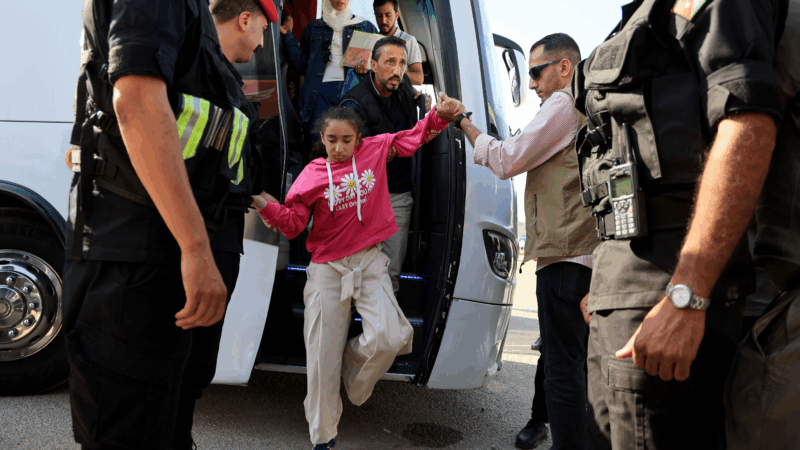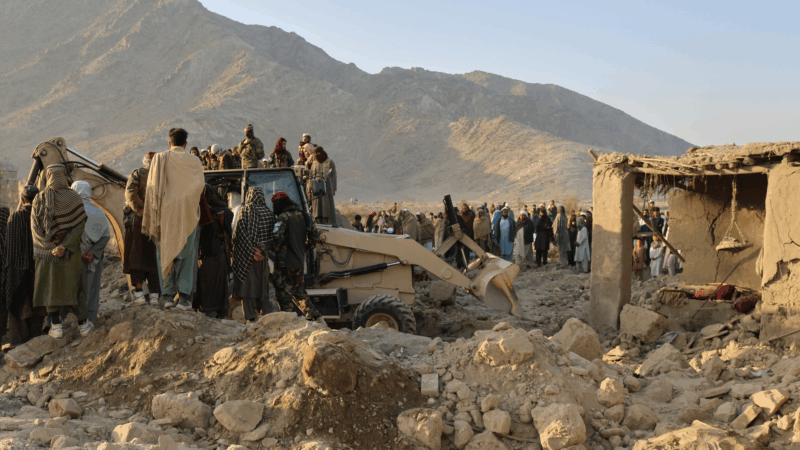A cancer center in Jordan treats kids from Gaza, but only a few dozen have arrived
AMMAN, Jordan — The King Hussein Cancer Center is huge and gleaming, with steel beams and floor-to-ceiling windows. Cozy cafes and stocked snack machines dot the air-conditioned lobby. It’s a stark contrast to conditions in Gaza, from where dozens of its latest patients have come.
“We couldn’t find food and wherever we went there were airstrikes,” says Safa Salha, who spent months going from damaged hospital to damaged hospital, seeking treatment for her 16-year-old son Youssef.
Youssef, a tall, quiet teenager who lets his mother do most of the talking, was in 10th grade before the war between Israel and Hamas started in October 2023 and shut down all the schools.
Last year, he was operated on in Gaza for a brain tumor pressing down on his optic nerve. His mother says the hospital was unable to do MRI scans before the surgery and couldn’t conduct a biopsy. Surgeons removed as much of the tumor as they could and sent him home two days later because they needed the bed, his mother says.
“The hardest thing was the decision to do the surgery,” says Salha, a teacher and school activities organizer. “You don’t know if the doctors were going to be able to finish the surgery, you don’t know if there’s medicine available, you don’t know if he was going to die during the surgery, or if we were going to die while he was there.”
Gaza health care in ruins
All of Gaza’s hospitals have been either damaged or destroyed in Israeli airstrikes. Israel says it has targeted Hamas sites rather than civilian infrastructure.
In January, the medical aid group Doctors Without Borders said Israeli attacks had killed 1,000 health care workers, a figure Gaza’s Health Ministry says has now grown to more than 1,400. Due to an Israeli blockade on food and medicine, hospitals that are partially opening do so with severe shortages of medicine, anesthesia and basic supplies.

UNICEF says more than 50,000 children in Gaza have been killed or injured during the war, which began after the militant group Hamas launched a cross-border attack into Israel. Gaza’s Health Ministry says more than 55,000 people, many of them women and children, have died. Israel says nearly 1,200 Israelis and foreigners were killed in the initial Oct. 7, 2023, attack.
Israel this spring intensified its attacks and aid agencies said in March that more than 12,000 people require urgent medical evacuation out of Gaza, including at least 4,500 children.
In February, President Trump suggested a plan to take over Gaza, displacing Palestinians to Jordan and Egypt while turning the enclave into a U.S.-controlled zone featuring beach-front property. Many Palestinians in Gaza were already displaced from their homes after the creation of Israel in 1948.
The relocation plan is seen by Jordan as an existential threat to the small kingdom, a death knell for hopes of an eventual Palestinian state and tantamount to complicity in ethnic cleansing of Gaza.
The king pledges to help 2,000 sick children
King Abdullah told Trump that Jordan was prepared to bring 2,000 child cancer patients and other extremely sick children to Jordan for treatment as quickly as possible.
But almost four months later, only a few dozen patients have arrived.

“There have been difficulties imposed by the Israeli authorities that are stopping the way of making this happen smoothly,” said Mohammad al-Momani, Jordan’s government communication minister.
Jordanian officials say Israel, which controls the Gaza border, has obstructed exit visas needed for medical evacuations for some patients and guardians needed to travel with them. It’s a long-standing issue: Physicians for Human Rights in Israel has taken the Israeli government to court to try to force them to allow more patients out.
The Israeli military did not respond to NPR queries about obstructing exit visas. The United Nations’ World Health Organization, which works with Israeli authorities and oversees logistics for medical evacuations, deferred comment to Israel.
Deadly delays
Health officials say delays in evacuations have meant diminished chances of survival for some of the sickest children, who elsewhere would receive immediate treatment.
“What we are seeing is really particular to Gaza patients — they are more advanced diseases,” says the King Hussein Cancer Center chief of pediatrics Rawad Rihani. “Cases where the tumor is very advanced with the lack of proper treatment and proper evaluation, or proper diagnosis, which makes them very hard to treat.”

Rihani says some of the tumors have grown so large they have damaged the children’s organs, leaving them in excruciating pain. With Israel’s strict controls on food and medicine entering Gaza, many of the patients are malnourished.
“These patients require intensive care unit support, they require respiratory support and they require a lot of nutritional support as well,” she says. “It makes the tumor very difficult to treat.”
Even though most childhood cancers are treatable, Rihani says, not all of the children evacuated to Jordan survive.
“Some of them are very advanced and went to palliative care,” Rihani says. “Unfortunately we are not able to save everyone.”
Jordan also operates two field hospitals in Gaza and was the major corridor for aid going to the territory by truck and air before Israel blocked aid shipments in March.

The King Hussein Cancer Center is one of the region’s leading cancer hospitals. Rihani says it has 44 pediatric cancer beds and 24 beds for pediatric bone marrow transplants, which can be supplemented by other hospitals that also treat cancer. Some of the arrivals require only out-patient treatment.
Rihani says no cancer patients treated in Jordan since the start of the Gaza war have been sent back to Gaza. Jordan has been criticized though for sending people back during the continuing conflict it says have fully completed treatment for other illnesses.
“We are bringing them by batches,” says Momani, the communications minister. “We will take these children to treat them but then after they finish their treatment they should be going back to their homeland. We don’t want to be in any way helping the displacement of Palestinians.”
Hunger stalking Gaza
With so many obstacles, patients and their families who have been evacuated to Jordan and other countries are among the very lucky few.
Zainab al-Astal arrived in Jordan with her sons Qassim, 15, and Ahmed, 13, in mid-May. Both the boys have lymphoma.
Displaced repeatedly by Israeli airstrikes, there was hardly any food, not even bread. Here, Astal says Ahmed has been dazzled by the abundance of shawarma — a sandwich of sliced chicken roasted on a spit.
“He says he wants to sit in the restaurant all day and just keep eating,” she says.
The day they were evacuated from Gaza, the Astals had gathered with other patients and guardians near a bus at the Gaza European Hospital to drive to the border when Israel bombed the complex, according to patients and the World Health Organization. Gaza civil defense authorities say at least 28 people, including patients, were killed in the airstrikes.
Israel said it was targeting a Hamas command and control center under the hospital. Israel released footage showing what it said were tunnels under the hospital complex to bolster its claim, but the heavily edited video could not be independently confirmed.

“I knew it was going to land near us but I couldn’t move,” says Astal. She says the impact threw the boys in the air and rained down so much debris she couldn’t see for 10 minutes.
Strangers threw themselves on the ground over the boys to protect them, she says.
The teenagers themselves speak very matter-of-factly about the bombings.
Leen al-Dabbas, a clinical psychologist at the cancer center, says many of the children are suffering from “masked depression” — not yet able to process what they’ve been through.
“When they first arrive they are in an adjustment period,” she says.
For many families the fear for their own lives has been replaced by relentless worry over loved ones they left behind in Gaza.
One girl, Suhair Zouroub, 13, sits with her mother Shayma’ and younger brother, a blue hospital bracelet on her thin wrist, ahead of her first rounds of chemotherapy.
She was diagnosed two months ago with leukemia. When she suffered seizures in Gaza, there was no treatment available. She describes huddling together with all of the family, hugging each other during the airstrikes. Her 2-1/2-year-old brother, Jude, pipes up with the word tiyara, Arabic for “plane.”
The eighth-grader had a 98% grade point average and says she wants to be an international lawyer.
“It’s very nice here,” she says in a quiet voice. “But Gaza is more beautiful. Nothing can ever be like home.”
Transcript:
: [POST-BROADCAST CORRECTION: In this story, we mistakenly identify the King Hussein Cancer Center as the King Hussein Medical Center.]
MARY LOUISE KELLY, HOST:
The nation of Jordan is treating seriously ill and injured Palestinians from Gaza, including dozens of child cancer patients. They are among 2,000 children King Abdullah promised President Trump back in February to bring in for treatment. So far, though, only 39 have arrived, NPR’s Jane Arraf has more from Amman.
UNIDENTIFIED PERSON: Going up. Doors closing.
JANE ARRAF, BYLINE: The King Hussein Medical Center, one of the region’s leading cancer hospitals, is huge and gleaming. There are floor-to-ceiling windows, stocked snack machines. It’s a stark contrast to what some of its latest patients have come from.
ZAINAB AL-ASTAN: (Non-English language spoken).
ARRAF: Zainab al-Astan (ph) arrived two weeks ago from Gaza with her sons Qassim, who is 15, and Ahmed, 13. Both have lymphoma. Displaced repeatedly by Israeli airstrikes, the family lived in a tent. There’s hardly any food, not even bread.
AL-ASTAN: (Non-English language spoken).
ARRAF: Here, Astan says, Ahmed can’t get enough of chicken sandwiches.
QASSIM: (Non-English language spoken).
ARRAF: Qassim describes trying to get treatment in Gaza amid the attacks on hospitals and shortages of medical supplies. The U.N. says there isn’t a single fully functional hospital or clinic in Gaza, with its population of around 2 million people. Israel says its attacks that have hit hospitals target the militant group Hamas.
(SOUNDBITE OF ARCHIVED RECORDING)
PRESIDENT DONALD TRUMP: Thank you very much. It’s an honor to have King Abdullah with us.
ARRAF: In February at the White House, Jordan’s King Abdullah made this offer to President Trump.
(SOUNDBITE OF ARCHIVED RECORDING)
KING ABDULLAH II: One of the things that we can do right away is take 2,000 children that are either cancer children or in a very ill state to Jordan as quickly as possible.
ARRAF: But almost four months later, only 39 patients have arrived.
MOHAMMAD MOMANI: There has been difficulties imposed by the Israeli authorities that is stopping with the way of making this happen smoothly.
ARRAF: That’s Jordan’s minister for government communications, Mohammad Momani.
MOMANI: We will take these children to treat them, but then after they finish their treatment, they should be going back to their homeland.
ARRAF: This week, more than two dozen more patients and their guardians were stranded in Gaza when Israel barred them from leaving, according to Jordanian officials. The Israeli military and the U.N.’s World Health Organization, which oversees evacuation logistics, did not respond to a request for comment. Cancer Center pediatrics chief Rawad Rihani says, while most childhood cancers are curable, recent arrivals are a special case.
RAWAD RIHANI: What we’re seeing, which is really particular to Gaza patients – more advanced diseases, when the tumor is very advanced with the lack of proper treatment and proper evaluation, proper diagnosis, which makes them very hard to treat.
ARRAF: Rihani says some of the tumors are so big, they’ve damaged the children’s organs. Many of the children are malnourished. The combination means not all will make it.
RIHANI: Some of them are very advanced and some went to palliative care.
ARRAF: Another patient, Suhair Zouroub, 13, has a much better prognosis.
SUHAIR ZOUROUB: (Non-English language spoken).
ARRAF: She was diagnosed two months ago with leukemia and will undergo chemotherapy. Before the war between Israel and Hamas shut down all the schools in Gaza, Zouroub was a star pupil, with a 98% grade point average.
SUHAIR: (Non-English language spoken).
ARRAF: Zouroub says in a quiet voice, “it’s very nice here. But Gaza is more beautiful.” She wants to go back after treatment. “There’s nothing better than home,” she says. Jane Arraf, NPR News, Amman.
Pakistan claims to have killed at least 70 militants in strikes along Afghan border
Pakistan's military killed at least 70 militants in strikes along the border with Afghanistan early Sunday, the deputy interior minister said.
Team USA faces tough Canadian squad in Olympic gold medal hockey game
In the first Olympics with stars of the NHL competing in over a decade, a talent-packed Team USA faces a tough test against Canada.
PHOTOS: Your car has a lot to say about who you are
Photographer Martin Roemer visited 22 countries — from the U.S. to Senegal to India — to show how our identities are connected to our mode of transportation.
Looking for life purpose? Start with building social ties
Research shows that having a sense of purpose can lower stress levels and boost our mental health. Finding meaning may not have to be an ambitious project.
Sunday Puzzle: TransformeR
NPR's Ayesha Rascoe plays the puzzle with listener Joan Suits and Weekend Edition Puzzlemaster Will Shortz.
Danish military evacuates US submariner who needed urgent medical care off Greenland
Denmark's military says its arctic command forces evacuated a crew member of a U.S. submarine off the coast of Greenland for urgent medical treatment.






